
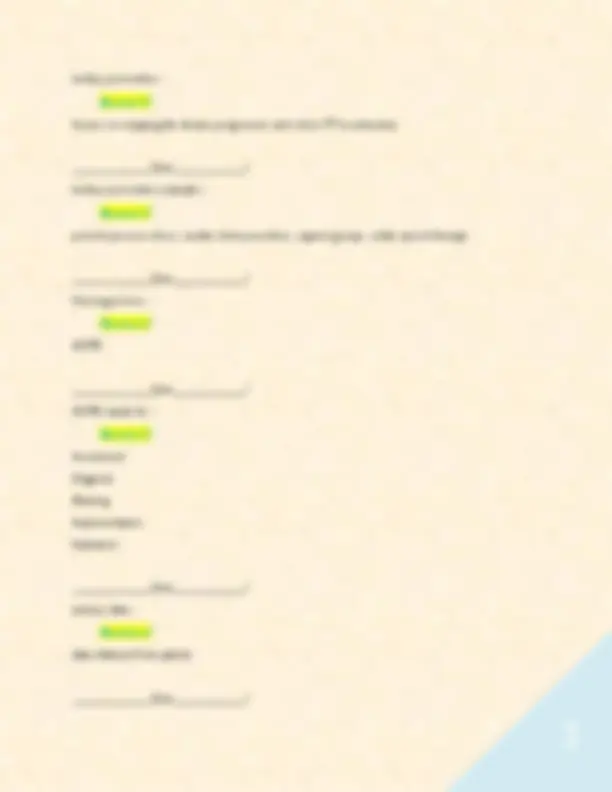
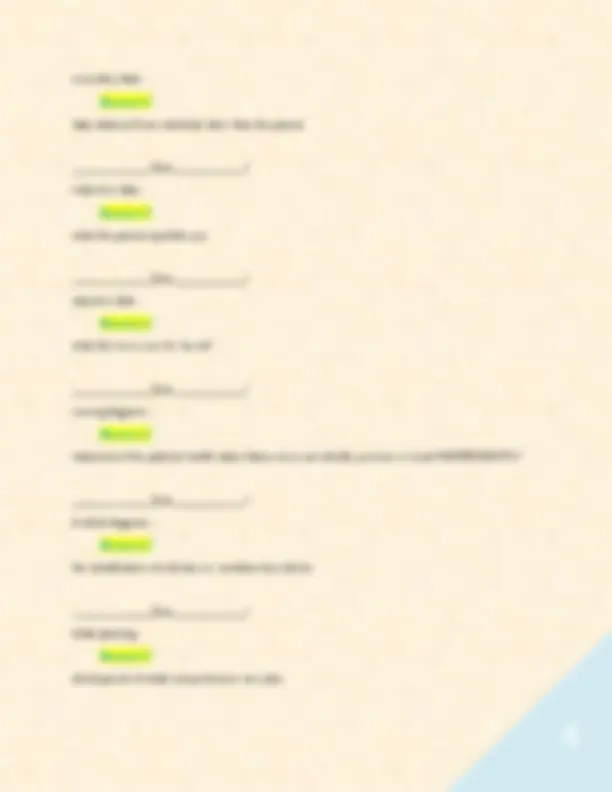
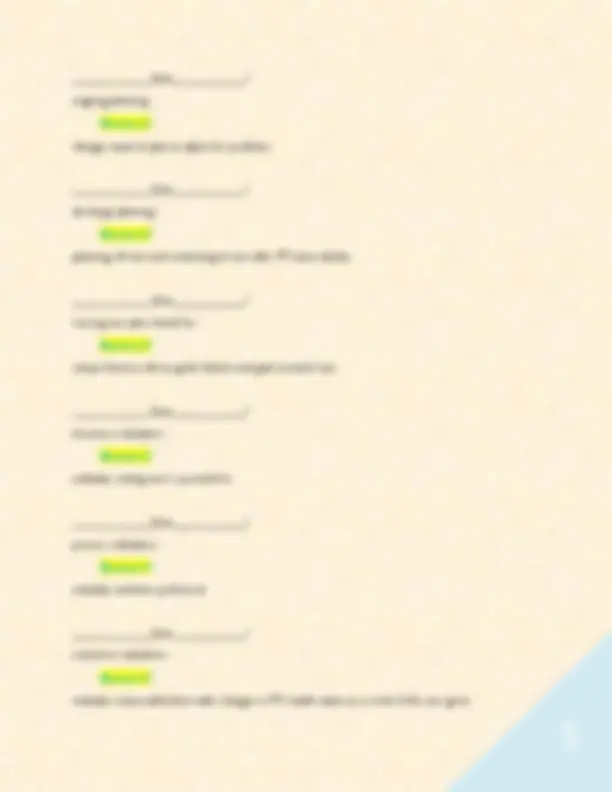
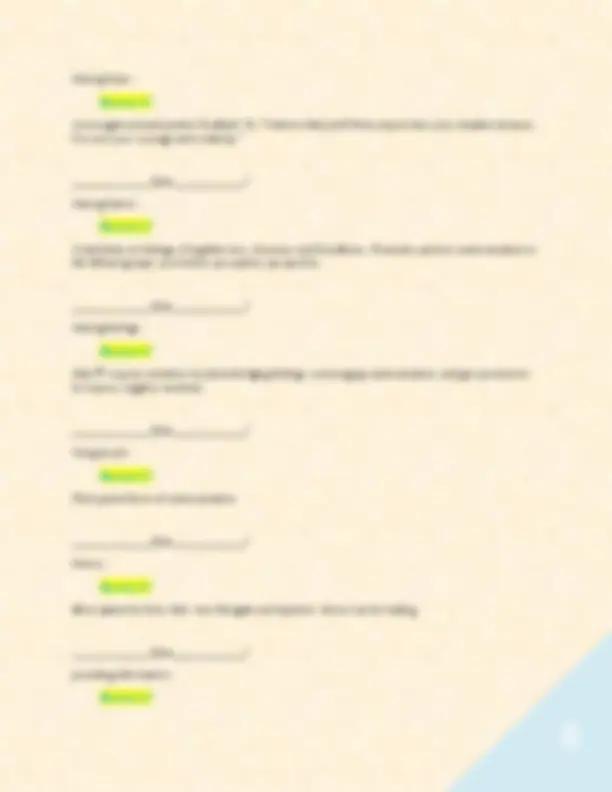
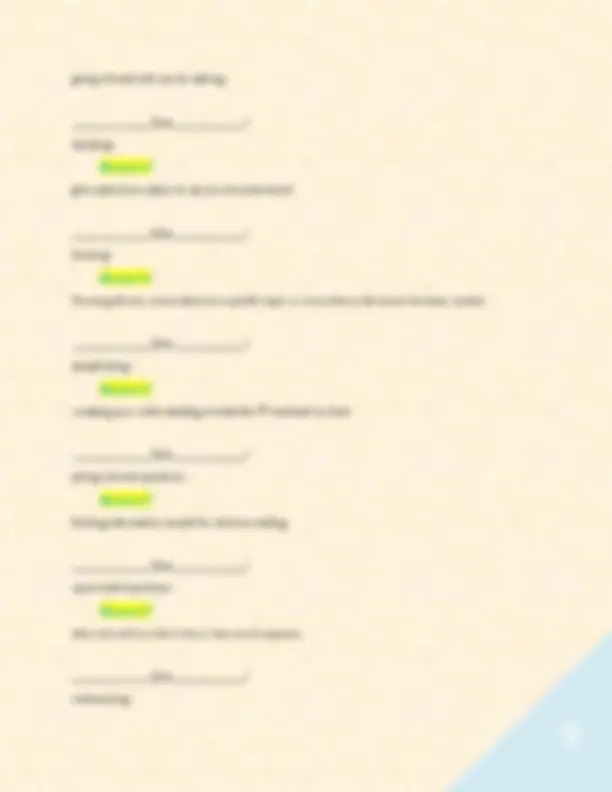
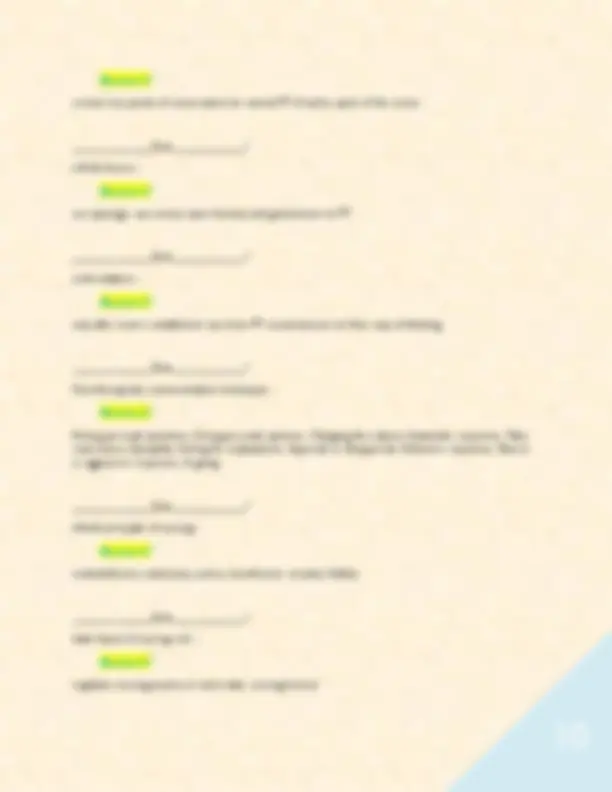
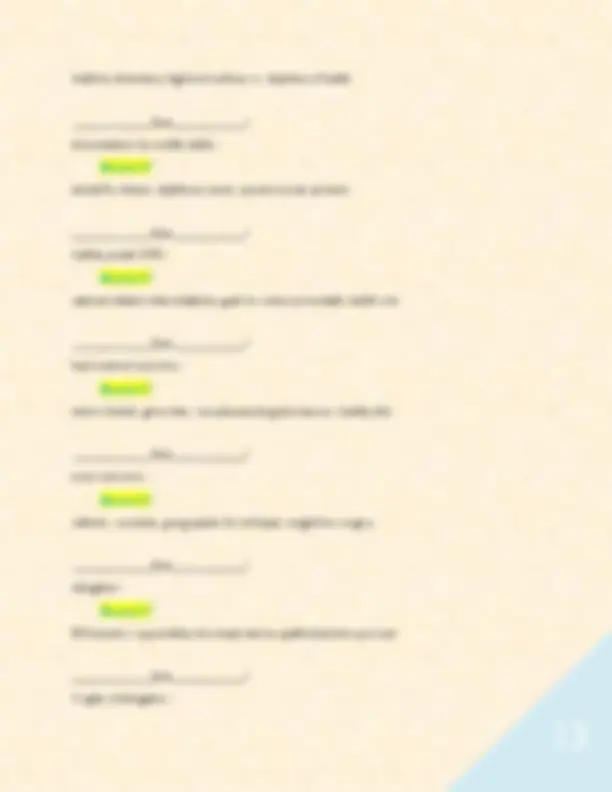
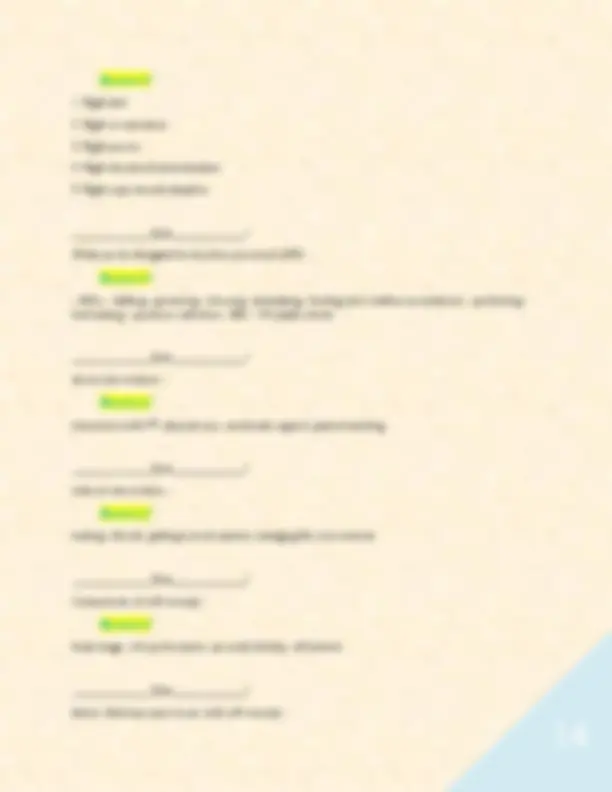
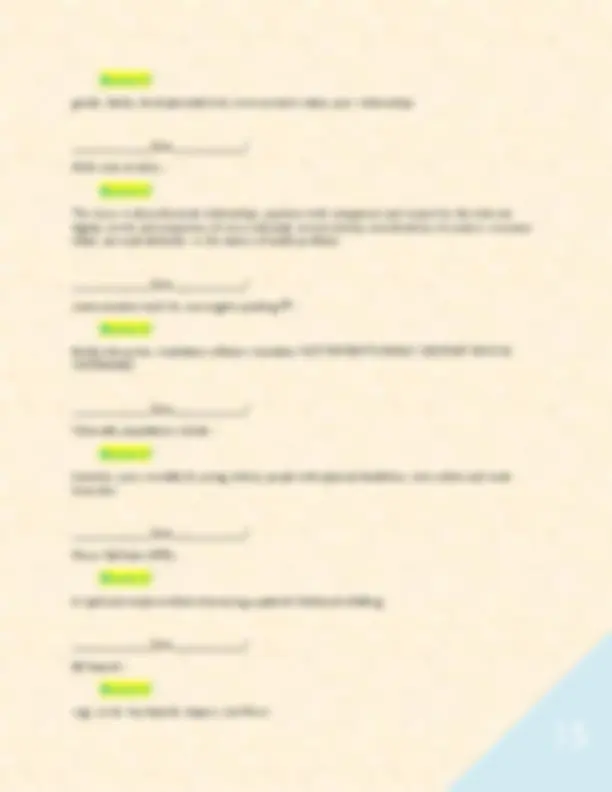


Study with the several resources on Docsity

Earn points by helping other students or get them with a premium plan


Prepare for your exams
Study with the several resources on Docsity

Earn points to download
Earn points by helping other students or get them with a premium plan
Community
Ask the community for help and clear up your study doubts
Discover the best universities in your country according to Docsity users
Free resources
Download our free guides on studying techniques, anxiety management strategies, and thesis advice from Docsity tutors
Arizona College of Nursing NUR 215 / NUR 215 exam 1 / Expert Strategies, Review of Key Quizzes, and Practice Questions for Guaranteed Success / Newest 2025/2026. Terms in this set (92) _____________Quiz____________? A of ABCs - Answer✓✓ airway _____________Quiz____________? B of ABCs - Answer✓✓ breathing _____________Quiz____________? C of ABCs - Answer✓✓ cardiac _____________Quiz____________? roles of RN - Answer✓✓ direct care provider, communicator, educator, patient advocate, counselor, change agent, leader, manager, case manager, research consumer _____________Quiz____________? nurse can do without Dr's orders - Answer✓✓ turn PT, provide comfort, raise head of bed, grooming/bathing, ice packs/heating pads, patient education, assistance in ADLs (activities of daily living), preventing falls, promote hydration and nourishment _____________Quiz____________? primary prevention - Answer✓✓
Typology: Exams
1 / 17

This page cannot be seen from the preview
Don't miss anything!










Terms in this set (92) _____________Quiz____________? A of ABCs -
airway _____________Quiz____________? B of ABCs -
breathing _____________Quiz____________? C of ABCs -
cardiac _____________Quiz____________? roles of RN -
direct care provider, communicator, educator, patient advocate, counselor, change agent, leader, manager, case manager, research consumer _____________Quiz____________? nurse can do without Dr's orders -
turn PT, provide comfort, raise head of bed, grooming/bathing, ice packs/heating pads, patient education, assistance in ADLs (activities of daily living), preventing falls, promote hydration and nourishment _____________Quiz____________? primary prevention -
prevent or slow onset of disease _____________Quiz____________? primary prevention example -
nutrition, exercise, wearing sunscreen, wearing seatbelt, using condoms, immunizations _____________Quiz____________? secondary prevention -
screening activities and education for detecting illnesses in the early stages _____________Quiz____________? secondary prevention examples -
breast self exams, testicular exams, regular physical exams, BP, bone density screenings _____________Quiz____________?
secondary data -
data obtained from individual other than the patient _____________Quiz____________? subjective data -
what the patient says/tells you _____________Quiz____________? objective data -
what the nurse sees for herself _____________Quiz____________? nursing diagnosis -
statement of the patients health status that a nurse can identify, prevent, or treat INDEPENDENTLY _____________Quiz____________? medical diagnosis -
the identification of a disease or condition by a doctor _____________Quiz____________? initial planning -
development of initial comprehensive care plan
_____________Quiz____________? ongoing planning -
changes made to plan to adjust for problems _____________Quiz____________? discharge planning -
planning self care and continuing of care after PT leaves facility _____________Quiz____________? nursing care plan should be -
comprehensive info to guide holistic and goal oriented care _____________Quiz____________? structure evaluation -
evaluates setting care is provided in _____________Quiz____________? process evaluation -
evaluates activities performed _____________Quiz____________? outcomes evaluation -
evaluates measurable/observable changes in PTs health status as a result of the care given
examine own beliefs, be aware of nonverbal communication, pay attention to PT's body language _____________Quiz____________? Modifiable risk factors -
risk factors can be reduced by change in diet, lifestyle, and stress _____________Quiz____________? nonmodifyable risk factors -
family history and genetics _____________Quiz____________? characteristics of a profession -
education, knowledge, service, code of ethics, accountability, professional organization _____________Quiz____________? active listening -
being attentive to what PT is saying _____________Quiz____________? sharing observations -
comment on how patient looks, sounds, or acts _____________Quiz____________?
sharing hope -
encouragement and positive feedback. Ex: "I believe that you'll find a way to face your situation because I've seen your courage and creativity." _____________Quiz____________? sharing humor -
Contributes to feelings of togetherness, closeness and friendliness. Promotes positive communication in the following ways; prevention, perception, perspective. _____________Quiz____________? sharing feelings -
help PT express emotions by acknowledging feelings, encouraging communication, and give permission to express negative emotions _____________Quiz____________? Using touch -
Most potent form of communication _____________Quiz____________? silence -
allow patient to form their own thoughts and opinions. silence can be healing _____________Quiz____________? providing information -
reviews key points of conversation to remind PT of earlier parts of the convo _____________Quiz____________? self-disclosure -
use sparingly, can convey open honesty and genuineness to PT _____________Quiz____________? confrontation -
only after trust is established. can show PT inconsistencies w/ their way of thinking _____________Quiz____________? Non-therapeutic communication techniques -
Asking personal questions, Giving personal opinions, Changing the subject, Automatic responses, False reassurance, Sympathy, Asking for explanations, Approval or disapproval, Defensive responses, Passive or aggressive responses, Arguing _____________Quiz____________? ethical principals of nursing -
nonmaleficence, autonomy, justice, beneficence, veracity, fidelity _____________Quiz____________? state board of nursing role -
regulates nursing practice in each state, nursing licenses
_____________Quiz____________? Nurse Practice Act -
law established to regulate nursing practice in each state _____________Quiz____________? cultural awareness -
appreciation of EXTERNAL signs of diversity _____________Quiz____________? cultural sensitivity -
awareness of uniqueness of other cultures _____________Quiz____________? cultural competence -
ability to incorporate culture into provision of care; shows respect _____________Quiz____________? Negotioation -
if PT does/doesn't believe in efficacy of a practice, negotiating acknowledges the gap _____________Quiz____________? restructuring -
attempt to change your actions or patient's lifestyle while still respecting their cultural beliefs
health as dichotomy; high-level wellness vs. depletion of health _____________Quiz____________? immunizations for middle adults -
annual flu, tetanus, diphtheria, zoster, pneumococcal, pertussis _____________Quiz____________? healthy people 2030 -
national initiative that establishes goals to reduce preventable health risks _____________Quiz____________? least invasive/restrictive -
toilet schedule, get a sitter, non-pharmacological measures, healthy diet _____________Quiz____________? most restrictive -
catheter, restraints, giving opiates for mild pain, weight loss surgery _____________Quiz____________? delegation -
RN transfers responsibility of a simple task to qualified assistive personel _____________Quiz____________? 5 rights of delegation -
interaction with PT: physical care, emotional support, patient teaching _____________Quiz____________? indirect intervention -
making referrals, getting second opinion, managing the environment _____________Quiz____________? Components of self-concept -
body image, role performance, personal identity, self-esteem _____________Quiz____________? factors that may cause issues with self concept -
_____________Quiz____________? reduce fall risk -
remove hazards on floor, use a shower chair, grab bars, non-skid bathroom mats, mobility aids, non-slip socks, fall risk bands, sign on door, bed/chair alarm _____________Quiz____________? interprofessional team members -
LPN, nurse practitioner, physician, physicians assistant, physical/occupational/speech therapist, lab personnel, case manager, pharmacists, dietician, spiritual care providers, alternative care providers _____________Quiz____________? common home safety hazards -
poisoning, carbon monoxide exposure, burns, smoking, heating equipment, home oxygen administration equipment, unsupervised children, unmonitored candles, faulty wiring, falls, firearm injuries, suffocation, take home toxins _____________Quiz____________? home safety teaching -
smoke and carbon monoxide detectors, safe med storage, seatbelt usage, helmet usage, secure firearms, label faucets hot/cold _____________Quiz____________? hospital safety measures -
_____________Quiz____________? R of RACE -
rescue; move PT to safe area _____________Quiz____________? A of RACE -
alarm; call EMS, pull fire alarm, alter others _____________Quiz____________? C of RACE -
contain; close doors, turn off oxygen _____________Quiz____________? E of RACE -
extinguish; using a fire extinguisher _____________Quiz____________? Seizure precautions -
secure rescue equipment, stay with PT and call for help, lower to floor or bed and protect head, do not restrain, do not place anything in mouth